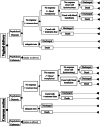Economic evaluation of carbetocin as prophylaxis for postpartum hemorrhage in the Philippines
- PMID: 33106169
- PMCID: PMC7586682
- DOI: 10.1186/s12913-020-05834-x
Economic evaluation of carbetocin as prophylaxis for postpartum hemorrhage in the Philippines
Abstract
Background: The World Health Organization (WHO) recommends oxytocin as the drug of choice for postpartum hemorrhage (PPH) prevention. However, the WHO has also recently considered carbetocin for PPH prevention, but only if carbetocin were a cost-effective choice in the country. Consequently, we determined the cost-effectiveness and budgetary impact of carbetocin against oxytocin in the Philippines.
Methods: A cost-utility analysis using a decision tree was done to compare the costs and outcomes of carbetocin with oxytocin for PPH prophylaxis among women undergoing either vaginal delivery (VD) or cesarean section (CS) in a six-week time horizon using a societal perspective. One-way and probabilistic sensitivity analyses were applied to investigate parameter uncertainties. Additionally, budget impact analysis was conducted using a governmental perspective. Results were presented as incremental cost-effectiveness ratio (ICER) using a 2895 United States dollar (USD) per quality adjusted life year (QALY) gained as the ceiling threshold in the Philippines.
Results: Carbetocin was not cost-effective given the listed price of carbetocin at 18 USD. Given a societal perspective, the ICER values of 13,187 USD and over 40,000 USD per QALY gained were derived for CS and VD, respectively. Moreover, the ICER values were sensitive to the risk ratio of carbetocin versus oxytocin and carbetocin price. On budget impact, the five-year total budget impact of a drug mix of carbetocin and oxytocin was 25.54 million USD (4.23 million USD for CS and 21.31 million USD for VD) compared with 'only oxytocin' scenario.
Conclusion: Carbetocin is not a cost-effective choice in PPH prevention for both modes of delivery in the Philippines, unless price reduction is made. Our findings can be used for evidence-informed policies to guide coverage decisions on carbetocin not only in the Philippines but also in other low and middle-income countries.
Keywords: Carbetocin; Economic evaluation; Oxytocin; Philippines; Postpartum hemorrhage.
Conflict of interest statement
The authors declare that they have no competing interests.
Figures





Similar articles
-
Cost-effectiveness of Carbetocin versus Oxytocin for Prevention of Postpartum Hemorrhage Resulting from Uterine Atony in Women at high-risk for bleeding in Colombia.Rev Bras Ginecol Obstet. 2018 May;40(5):242-250. doi: 10.1055/s-0038-1655747. Epub 2018 Jun 18. Rev Bras Ginecol Obstet. 2018. PMID: 29913541 Free PMC article.
-
Cost-effectiveness analysis of carbetocin for prevention of postpartum hemorrhage in a low-burden high-resource city of China.PLoS One. 2022 Dec 15;17(12):e0279130. doi: 10.1371/journal.pone.0279130. eCollection 2022. PLoS One. 2022. PMID: 36520799 Free PMC article.
-
Carbetocin versus oxytocin for prevention of post-partum haemorrhage at caesarean section in the United Kingdom: An economic impact analysis.Eur J Obstet Gynecol Reprod Biol. 2017 Mar;210:286-291. doi: 10.1016/j.ejogrb.2017.01.004. Epub 2017 Jan 3. Eur J Obstet Gynecol Reprod Biol. 2017. PMID: 28088109
-
Current research on carbetocin and implications for prevention of postpartum haemorrhage.Reprod Health. 2018 Jun 22;15(Suppl 1):94. doi: 10.1186/s12978-018-0529-0. Reprod Health. 2018. PMID: 29945640 Free PMC article. Review.
-
Efficacy of carbetocin in the prevention of postpartum hemorrhage: a systematic review and Bayesian meta-analysis of randomized trials.J Matern Fetal Neonatal Med. 2021 Jul;34(14):2303-2316. doi: 10.1080/14767058.2019.1664463. Epub 2019 Sep 19. J Matern Fetal Neonatal Med. 2021. PMID: 31537134
Cited by
-
Implementing Heat-Stable Carbetocin for Postpartum Haemorrhage Prevention in Low-Resource Settings: A Rapid Scoping Review.Int J Environ Res Public Health. 2022 Mar 22;19(7):3765. doi: 10.3390/ijerph19073765. Int J Environ Res Public Health. 2022. PMID: 35409454 Free PMC article.
-
Patient blood management to minimize transfusions during the postpartum period.Obstet Gynecol Sci. 2023 Nov;66(6):484-497. doi: 10.5468/ogs.22288. Epub 2023 Aug 8. Obstet Gynecol Sci. 2023. PMID: 37551109 Free PMC article.
-
Heat-Stable Carbetocin in the Management of Postpartum Haemorrhage in Low- and Middle-Income Countries: A Comprehensive Review of Clinical Evidence, Cost-Effectiveness, Implementation Challenges and Adoption Strategies.Int J Womens Health. 2025 Jun 3;17:1615-1630. doi: 10.2147/IJWH.S515252. eCollection 2025. Int J Womens Health. 2025. PMID: 40487679 Free PMC article. Review.
-
The cost-effectiveness of preventing, diagnosing, and treating postpartum haemorrhage: A systematic review of economic evaluations.PLoS Med. 2024 Sep 13;21(9):e1004461. doi: 10.1371/journal.pmed.1004461. eCollection 2024 Sep. PLoS Med. 2024. PMID: 39269991 Free PMC article.
-
Effect of Carbetocin on Postpartum Hemorrhage after Vaginal Delivery: A Meta-Analysis.Comput Math Methods Med. 2022 Jun 20;2022:6420738. doi: 10.1155/2022/6420738. eCollection 2022. Comput Math Methods Med. 2022. PMID: 35770122 Free PMC article.
References
-
- Philippine Statistics Authority. MDG Watch as of May 2016, https://psa.gov.ph/sites/default/files/kmcd/MDG%20Watch%20as%20of%20May2... (2016, Accessed October 7 2019).
-
- Amornpetchakul P, Lertbunnaphong T, Boriboonhiransarn D, et al. Intravenous carbetocin versus intravenous oxytocin for preventing atonic postpartum hemorrhage after normal vaginal delivery in high-risk singleton pregnancies: a triple-blind randomized controlled trial. Arch Gynecol Obstet. 2018. 10.1007/s00404-018-4806-5. - PubMed
MeSH terms
Substances
Grants and funding
LinkOut - more resources
Full Text Sources

